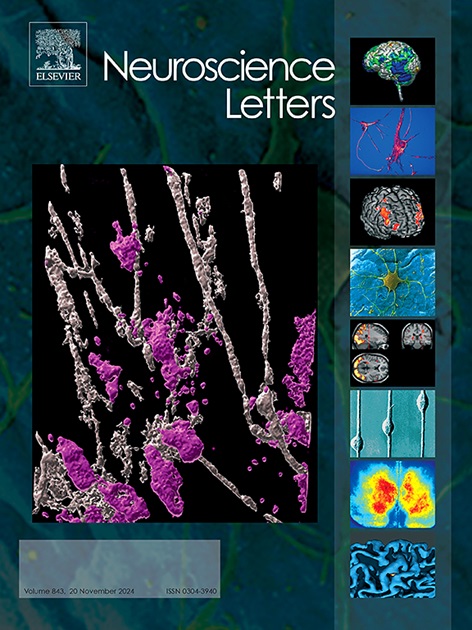Effects of pharmacological inhibition of FABP4 during gestation and lactation on offspring neurodevelopment and behavior
IF 2
4区 医学
Q3 NEUROSCIENCES
引用次数: 0
Abstract
Fatty acid-binding protein 4 (FABP4), a key regulator of lipid metabolism and inflammation, has been implicated in neurodevelopmental disorders, including autism spectrum disorder (ASD). This study investigated the effects of FABP4 inhibition during gestation and lactation on offspring neurodevelopment using the selective FABP4 inhibitor BMS309403. Female mice received BMS309403 (15 mg/kg) via oral gavage from two weeks before mating to postnatal day 28 (P28). Administration of BMS309403 to mouse dams resulted in autism-like phenotypes in male offspring (behavioral tests: n = 7–10 per group; spine analysis: 6 mice per group, n = 26–38 dendrites per group), characterized by increased dendritic spine density in the prefrontal cortex, impaired vocal communication, increased repetitive behaviors, and depression-like symptoms. Fatty acid analysis (n = 4–6 per group) revealed significant alterations in maternal and fetal lipid profiles, including elevated arachidonic acid levels in maternal plasma and increased n6PUFAs in the fetal brain, suggesting a pro-inflammatory lipid environment. Principal component analysis demonstrated distinct clustering of lipid profiles between control and BMS309403-treated groups. Cytokine analysis (n = 6 per group) indicated reductions in IL-10 and IL-12(p40) in maternal plasma and decreased TNFα in the fetal plasma, suggesting dysregulation in systemic inflammatory signaling. These findings suggest that FABP4 inhibition during the perinatal period perturbs lipid metabolism and may influence neurodevelopment through systemic metabolic changes. Although the direct effects of BMS309403 on the fetal brain cannot be excluded, alteration in maternal metabolism and placental function may have contributed to the observed neurodevelopmental changes in offspring.
妊娠和哺乳期药物抑制FABP4对子代神经发育和行为的影响。
脂肪酸结合蛋白4 (FABP4)是脂质代谢和炎症的关键调节因子,与包括自闭症谱系障碍(ASD)在内的神经发育障碍有关。本研究利用选择性FABP4抑制剂BMS309403研究了妊娠和哺乳期FABP4抑制对后代神经发育的影响。雌性小鼠从交配前2周至产后28天灌胃BMS309403(15 mg/kg) (P28)。给小鼠注射BMS309403导致雄性后代出现自闭症样表型(行为测试:n = 每组7-10;脊柱分析:每组6只小鼠,n = 每组26-38个树突),其特征是前额皮质树突棘密度增加,声音交流受损,重复行为增加,抑郁样症状。脂肪酸分析(n = 每组4-6)显示,母体和胎儿的脂质谱发生了显著变化,包括母体血浆中花生四烯酸水平升高,胎儿大脑中n6PUFAs增加,表明存在促炎脂质环境。主成分分析显示,在对照组和bms309403治疗组之间存在明显的脂质聚类。细胞因子分析(n = /组6)显示母体血浆中IL-10和IL-12(p40)减少,胎儿血浆中tnf - α减少,提示全身炎症信号失调。这些发现提示围产期FABP4抑制可扰乱脂质代谢,并可能通过全身代谢改变影响神经发育。虽然不能排除BMS309403对胎儿大脑的直接影响,但母体代谢和胎盘功能的改变可能导致了后代神经发育的变化。
本文章由计算机程序翻译,如有差异,请以英文原文为准。
求助全文
约1分钟内获得全文
求助全文
来源期刊

Neuroscience Letters
医学-神经科学
CiteScore
5.20
自引率
0.00%
发文量
408
审稿时长
50 days
期刊介绍:
Neuroscience Letters is devoted to the rapid publication of short, high-quality papers of interest to the broad community of neuroscientists. Only papers which will make a significant addition to the literature in the field will be published. Papers in all areas of neuroscience - molecular, cellular, developmental, systems, behavioral and cognitive, as well as computational - will be considered for publication. Submission of laboratory investigations that shed light on disease mechanisms is encouraged. Special Issues, edited by Guest Editors to cover new and rapidly-moving areas, will include invited mini-reviews. Occasional mini-reviews in especially timely areas will be considered for publication, without invitation, outside of Special Issues; these un-solicited mini-reviews can be submitted without invitation but must be of very high quality. Clinical studies will also be published if they provide new information about organization or actions of the nervous system, or provide new insights into the neurobiology of disease. NSL does not publish case reports.
 求助内容:
求助内容: 应助结果提醒方式:
应助结果提醒方式:


